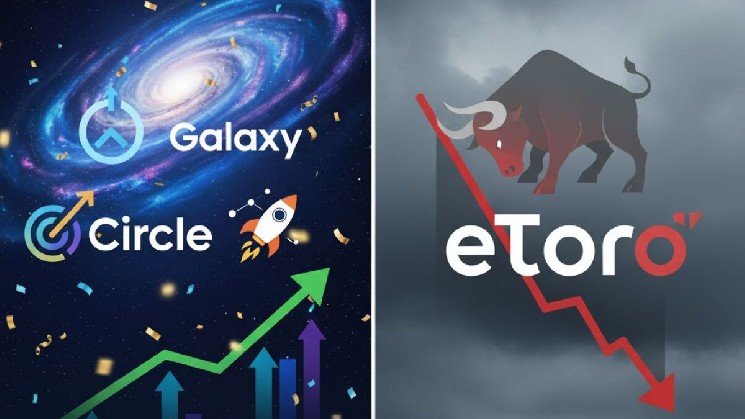TL;DR:
- Circle and Galaxy remain profitable despite post-IPO volatility.
- eToro’s stock price has fallen nearly 40% since its debut.
- Investors prefer stable and system-oriented crypto companies.
Introducing Circle and Galaxy Digital. The only virtual currency company that is still profitable after going publicThis is in sharp contrast to peers like eToro, which has seen its valuation plummet. This divergence highlights that the post-IPO landscape of crypto companies remains volatile, shaped by shifts in market sentiment, regulatory pressures, and investor confidence.
Only a select few crypto IPOs remain green
Circle’s IPO performance defied broader market struggles, supported by strong USDC business and increased institutional demand. Despite industry headwinds, Circle remains profitable as the USDC stablecoin continues to play a central role in decentralized finance and cross-border transactions. A consistent revenue stream from reserves and fees helps maintain investor confidence even in volatile market conditions.
Galaxy Digital has also managed to stay afloat, leveraging its diversified exposure to both digital assets and financial services. Founded by Mike Novogratz, Galaxy has been able to remain resilient due to its ability to balance trading operations, asset management, and infrastructure investments. Its adaptability positions the company as one of the few crypto-native companies that can thrive in both bull and bear markets.
In stark contrast, eToro’s stock price has fallen nearly 40% since its debut, reflecting broader challenges in the retail trading platform. Once hailed as a pioneer in social investing, eToro has faced declining user numbers and declining trading activity. Increasing competition and regulatory scrutiny further weakened the company’s market performance, making it one of the biggest post-IPO underperformers in the crypto fintech space.
The contrasting fortunes of these companies demonstrate that the recovery within the cryptocurrency sector is uneven. While Circle and Galaxy have benefited from diversified institutional models, retail-led platforms like eToro have struggled to adapt. Market preferences appear to be shifting toward companies that can balance transparency, compliance, and profitability, a sign that investors are seeking stability in an industry long defined by volatility.


